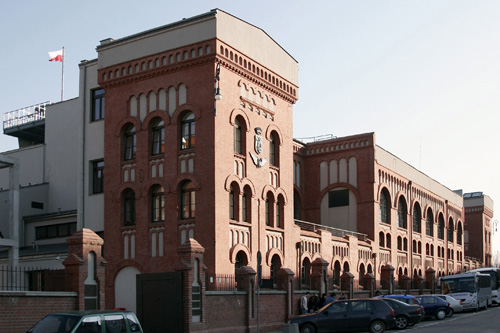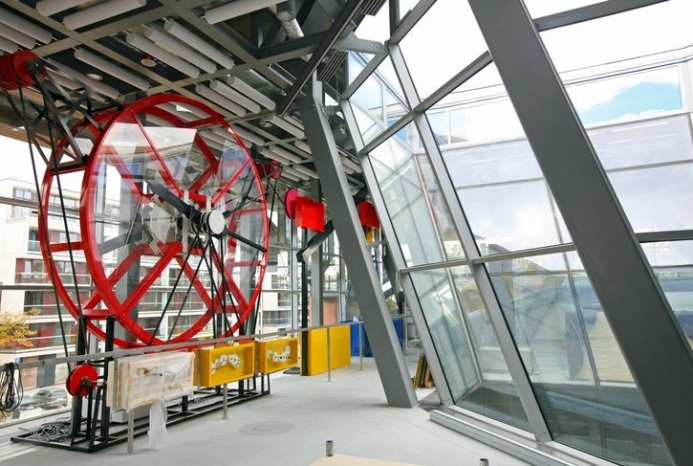Conference program
Jump to:
Monday,
Tuesday,
Wednesday,
Thursday,
Friday,
Social events
Program with abstracts of all presentations can be downloaded here.
The 9th Conference of the European Social Simulation Association (ESSA 2013) takes place at Warsaw School of Economics "C" building, al. Niepodległości 128.
Monday, 2013/09/16 (back to top)
Tuesday, 2013/09/17 (back to top)
| Hour | Program & location |
| 8:40-9:00 | Conference opening ceremony
Location: Aula I |
| 9:00-9:45 | Keynote presentation: Andrzej Nowak
Social influence and social transitions: Computational model and empirical data
Location: Aula I |
| 9:45-10:00 | Coffee break
Location: Lobby |
| 10:00-11:30 | Parallel session: Adaptive behavior, social interactions and global environmental change: an agent-based perspective (1)
Session Chair: Rianne van Duinen
Location: Aula I
- Alexander Remesch: Farmer’s Decision-Making and Land Use Intensification: An Agent-based Model of the Enns valley, Upper Austria, 1830-2030
- Davide Natalini: Modelling future growth – How country behaviours will respond to resource constraints and environmental degradation
- Diana Neghina: Cyber attacker’s behavioral simulation under economical change
- Rianne van Duinen: Farmers' social interactions, drought adaptation decision-making and diffusion in a drought risk context : an agent-based approach
|
Parallel session: General track
Session Chair: Abhijit Sengupta
Location: Aula II
- Keiichi Kubota: Effects of Corporate Tax Rate Cuts on Firms’ Investment and Valuation: A Microsimulation Approach
- Harmen De Weerd: Agent-based models for higher-order theory of mind
- Alexander Tarvid: Battling with Overeducation: Will Restricting Access to Higher Education Work in the Presence of Social Networks?
- Abhijit Sengupta: Technology Diffusion under Sequential Innovation: The Optimal Intellectual Property Regime
|
| 11:30-11:45 | Coffee break
Location: Lobby |
| 11:45-13:15 | Parallel session: Adaptive behavior, social interactions and global environmental change: an agent-based perspective (2)
Session Chair: Tatiana Filatova
Location: Aula I
- Nanda Wijermans: Agent-based Case Studies for Understanding of Social-Ecological Systems: Cooperation on Irrigation in Bali.
- Giangiacomo Bravo: A replication and extension of common-pool resource experiments using agent-based modelling
- Arend Ligtenberg: Simulating Opinion Dynamics in Land Use Planning
- Souhir Masmoudi: Mimicking strategies and network structure’s effects on prices and market share volatility
- Tatiana Filatova: Changing climate, changing behavior: adaptive economic behavior and housing markets responses to flood risks
|
Parallel session: General track
Session Chair: Emile Chappin
Location: Aula II
- Syed Muhammad Ali Abbas: Towards Validating Social Network Simulations
- Francesca Giardini: Punishment and gossip: Sustaining cooperation in a Public Goods Game
- Gaurang Phadke: An agent-based simulation tool for the evaluation of surgical-operation schedules
- Emile Chappin: Linked open data driven energy modelling: viewpoint
|
| 13:15-14:30 | Lunch break
Location: Lobby |
| 14:30-15:45 | Parallel session: General track
Session Chair: Maurits Ertsen
Location: Aula I
- Georg Holtz: Testing model robustness – Variation of farmers’ decision-making in an agricultural land-use model
- Ivan Garibay: A Preliminary Agent-Based Study on the Regional Impact of Business Incubation
- Maurits Ertsen: Gone water does mill again. Modelling irrigation at the archaeological site of Las Capas, Arizona (USA)
|
Parallel session: General track
Session Chair: Claudio Cioffi-Revilla
Location: Aula II
- Shady Atallah: The Spatial-Dynamic Economics of Plant Diseases: Grapevine Leafroll Disease
- Jonathan Hourez: A multi-agent system to simulate school choice in French Speaking Belgium
- Claudio Cioffi-Revilla: On the Quality of a Social Simulation Model
|
| 15:45-16:00 | Coffee break
Location: Lobby |
| 16:00-17:45 | Parallel session: Statistical analysis of simulation models
Session chair: Bogumił Kamiński
Location: Aula I
- Iris Lorscheid: Simulation Model and Data Analysis: Where are we and where should we go?
- Przemyslaw Szufel: Controlling complex parameter sweep in object-oriented simulation models
- Andrzej Jarynowski: Studying possible outcomes in model of sexual transmitted virus (HPV) causing cervical cancer for Poland
- Mateusz Zawisza: The importance of step length in numerical equilibrium identification
- Andreas Koch: The Spatial Impact of Urban Social Segregation
|
Parallel session: Social simulation of science processes
Session Chair: Flaminio Squazzoni
Location: Aula II
- Warren Thorngate: By the numbers: Track record, flawed reviews, journal space, and the fate of talented authors
- Petra Ahrweiler: Modelling research networks
- Melanie Baier: Heterogeneous, satisficing scientists on the road to scientific consensus
- Bulent Ozel: A Multi-agent Simulation Model on Individual Cognitive Structures and Collaboration in Sciences
- Flaminio Squazzoni: Can Editors Compensate for the “Luck of the Reviewer Draw” Effect in Peer Review? An Agent-Based Model
|
| 17:45-19:00 | Poster session:
Location: Lobby
- Gabriel Awad: Challenges and Opportunities for the Meeting of Two Worlds
- Guus ten Broeke: Using an Agent-Based Model to study the Effects of Enforced Quota for Sustainable Tuna Fishery
- Diana Adamatti: A Computational Model to Malaria: A Multi-Agent-Based Approach
- Matthijs Danes: The Dutch Greenhouse Industry as an ABM concept
- Juan Fernandez-Gracia: Agent based model for voting behavior based on imperfect imitation and recurrent mobility
- Amineh Ghorbani: Evaluating ABMS tools
- Cara H. Kahl: Micro-Validating Agent-Based Models with Internet-Based & Laboratory Experiments
- Setsuya Kurahashi: Teaching and collaborative learning simulation using a doubly structural network model
- Nuno T. Magessi: Simulating risk of tax evasion
- Radosław Nielek: Flexible Framework for Multi Agent Simulation on GPU
- Bulent Ozel: Design and Development of Multi-agent Simulation Models of Financial Markets
- Edyta Pierewoj: Pay-to-Bid - an agent based model approach
- Frederik Schaff: An Agent-based Alternative to Neoclassical Economics
- George Van Voorn: Concepts and Methods for Sensitivity Analysis of Agent-Based Models
|
Wednesday, 2013/09/18 (back to top)
| Hour | Program & location |
| 9:00-9:45 | Keynote presentation: Dirk Helbing
Towards Simulating the Foundations of Society
Location: Aula I |
| 9:45-10:00 | Coffee break
Location: Lobby |
| 10:00-11:30 | Parallel session: Adaptive behavior, social interactions and global environmental change: an agent-based perspective (3)
Session Chair: Wander Jager
Location: Aula I
- Alex Smajgl: Agent-based Simulation of Government Incentives for Diversifying Rubber in Yunnan, China
- Peter Johnson: Soil and Water conservation AdoPtion: the SWAP model - theory and policy applications using agent-based modeling
- Calum Brown: An agent-based model of European land use dynamics
- Wander Jager: Diffusion dynamics of electric cars and adaptive policy: towards an empirical based simulation
|
Parallel session:Using qualitative data to inform behavioral rules (1)
Session Chair: Bruce Edmonds
Location: Aula II
- Martin Neumann: Grounded Simulation
- Tilman Schenk: Generating an agent based model from interviews and observations: procedures and challenges
- Bruce Edmonds: Towards a Context- and Scope-Sensitive Analysis for Specifying Agent Behaviour
|
| 11:30-11:45 | Coffee break
Location: Lobby |
| 11:45-13:15 | Parallel session: Adaptive behavior, social interactions and global environmental change: an agent-based perspective (4)
Session Chair: Olivier Barreteau
Location: Aula I
- Erika N. Speelman: An agent-based modelling approach for the simulation of social-ecological systems; a case study of a rural landscape
- Ramón Briegel: A social-psychologically founded model of the diffusion of green electricity
- Olivier Barreteau: Agent Based Simulation of Drought Management in Practice
|
Parallel session: Using qualitative data to inform behavioral rules (2)
Session Chair: Ozge D. Kalkan
Location: Aula II
- Cesar Enrique Garcia Diaz: Using qualitative data to explore knowledge transfer scenarios in agent-based models: the case of zero-energy buildings
- Sukaina Bharwani: What drives decision-making on livelihood options in the forest communities of Cameroon?
- Magnus Josefsson: Interpreting the conundrum of social mechanisms: Insights from grounded theory.
- Ozge D. Kalkan: A Grounded Simulation of Early Adoption Advantages During Diffusion of Innovations
|
| 13:15-14:30 | Lunch break
Location: Lobbby |
| 15:00 | Social events (see below) |
Thursday, 2013/09/19 (back to top)
| Hour | Program & location |
| 9:00-9:45 | Keynote presentation: Robert Axtell
Full-scale models: What can be learned from studying entire economies computationally?
Location: Aula I |
| 9:45-10:00 | Coffee break
Location: Lobby |
| 10:00-11:30 | Parallel session: Adaptive behavior, social interactions and global environmental change: an agent-based perspective (5)
Session Chair: Loïs Vanhée
Location: Aula I
- Alexander Funcke: Cekperiment: behavioral experiments and simulations in the cloud
- Elvira Uyarra: Understanding cluster emergence and policy: An agent-based approach
- Loïs Vanhée: Agent-Based Evolving Societies
|
Parallel session: Using qualitative data to inform behavioral rules (3)
Session Chair: Emma Norling
Location: Aula II
- Nicolas Gailliard: Participatory policy making in practice: simulating boundary work in water governance
- Pablo Lucas: An Adaptation of the Ethnographic Decision Tree Modeling Methodology for Developing Evidence-Driven Agent-Based Models
- Amineh Ghorbani: Using Ethnographic Information to Conceptualize Agent-based Models
- Emma Norling: An Approach to Capturing Cognitive Processes
|
| 11:30-11:45 | Coffee break
Location: Lobby |
| 11:45-13:15 | Parallel session: Heterogeneity and interaction in macroeconomic modeling (1)
Session Chair: Grzegorz Koloch
Location: Aula I
- Alberto Russo: Growing Inequality, Financial Fragility, and Macroeconomic Dynamics: An Agent Based Model
- Lorena Cadavid: Saddle points in innovation diffusion curves: an explanation from bounded rationality
- Liv Lundberg: A hierarchy of economic models for agricultural land-use
- Sascha Hokamp: How much Rationality Tolerates the Shadow Economy? - An Agent-based Econophysics Approach
|
Parallel session: Using qualitative data to inform behavioral rules (4)
Session Chair: Krzysztof Kulakowski
Location: Aula II
- Frank Schiller: Defining relevance and finding rules: an agent-based model of biomass use in the Humber area
- Serge Bobo Kadiri: Raising the awareness of local populations about the sustainability of bushmeat hunting through the incremental introduction of an agent-based model. A case study in the region of Korup National Park (Cameroon)
- Armando Geller: Eliciting Information for Multiagent Modeling using Contexts and Scenarios
- Krzysztof Kulakowski: Discrete chaos in everyday life
|
| 13:15-14:30 | Lunch break
Location: Lobby |
| 14:30-16:00 | Parallel session: Applications of computational social science to business strategy and organizational behavior
Session Chair: Maciej Latek
Location: Aula I
- Doug Samuelson: Multi-Player Harem Games: Value of Information and Disinformation in Competitive Decision-Making
- Yukihisa Fujita: Estimation of Production Rate Limits Using Agent-based Simulation for Oil and Gas Plants Safety
- Fabian Kostadinov: An agent-based model of a Swiss real estate market
- Emily Galloway: Social Price Targeting: Use of Network Structure in Firm Decision Making
- Norman Kellermann: Revenue management for railways – assessing the effects of pricing decisions by means of agent-based simulation
|
Parallel session: General track
Session Chair: Przemysław Szufel
Location: Aula II
- Diana Adamatti: Analyzing the Problem of the Modeling of Periodic Normalized Behaviors in Multiagent-based Simulation of Social Systems: the case of the San Jerónimo Vegetable Garden of Seville, Spain
- Benoit Gaudou: Moral Guilt: An Agent-Based Model Analysis
- Thomas Brudermann: Sharing Electricity in Urban Emergency Cases – An Agent-based Perspective
- Sascha Holzhauer: The Impact of Social Network Configurations on Public Good Provision
|
| 16:00-16:15 | Coffee break
Location: Lobby |
| 16:15-17:45 | Parallel session: Applications of computational social science in conflict and sensitive contexts
Session Chair: Armando Geller
Location: Aula I
- Martin Neumann: An Ontology of Extortion Racket Systems
- Armando Geller: Of Humanitarians and Force: Light Intervention to Protect Civilians in Internal Armed Conflicts
|
Parallel session: General track
Session Chair: Francisco J. Miguel Quesada
Location: Aula II
- Takashi Yamada: Adaptive learning and quasi fictitious play in "do-it-yourself lottery" with incomplete information
- Friedrich Krebs: The interaction of social conformity and social orientation in public good dilemmas
- Isamu Okada: Organizational structure and wage incentives to sustain high morale: An agent-based approach
- Francisco J. Miguel Quesada: Simulating Ethnogenesis and Cultural Diversity in Small-Scale Social Formations
|
| 19:30 | Gala Dinner
Location: "Bazyliszek" restaurant in the heart of Warsaw Old Town
Menu: download PDF
Optional transport to the restaurant: departure at 18:45 sharp from "C" building |
Friday, 2013/09/20 (back to top)
| Hour | Program & location |
| 9:00-10:30 | Parallel session: General track
Session Chair: Carsten Buchmann
Location: Aula I
- Simone Gabbriellini: A new framework for ABMs based on argumentative reasoning
- Christopher Watts: Simulating Innovation: Comparing Models of Collective Knowledge, Technological Evolution and Emergent Innovation Networks
- Carsten Buchmann: Simulating residential mobility in a shrinking city: the concept of an agent-based approach for a medium sized town in Germany
|
Parallel session: Heterogeneity and interaction in macroeconomic modeling (2)
Session Chair: Sascha Holzhauer
Location: Aula II
- Pawel Strzelecki: Why should the population projection be microsimulation? – about the advantages of integrating micro and macro approach in demography
- Jakub Mazur: Identifying the social and economic impact of illegal immigration – a multi-agent approach
- Marek Antosiewicz: A DSGE model with strong heterogeneity ex-post
- Przemyslaw Szufel: On searching for an optimal structure of higher education system financing
|
| 10:30-10:45 | Coffee break
Location: Lobby |
| 10:45-12:15 | Parallel session: General track
Session Chair: Mateusz Zawisza
Location: Aula I
- Richard Oliver Legendi: Agent-Based Dynamic Network Models: Validation on Empirical Data
- Karol Wawrzyniak: Grand canonical minority game as a sign predictor
- Qingsheng Meng: Housing Policy Simulation, prediction and supervision
|
Parallel session: Heterogeneity and interaction in macroeconomic modeling (3)
Session Chair: Jakub Growiec
Location: Aula II
- Paweł Wojtkiewicz: Virtual economy: Modeling the economy of MMOG
- Grzegorz Koloch: Optimal Inflation in a Heterogeneous Agent Economy
- Jakub Growiec: On Aggregating Human Capital Across Heterogeneous Cohorts
|
| 12:15-13:00 | Conference closing ceremony
Location: Aula I |
Social events program (back to top)
During the conference on Wednesday afternoon participants can choose one of the following excursions (cost not included in conference fee, final pricing depends on number of participants):

|
The Warsaw Rising Museum
Approximate cost: 10 EUR
Start: 16:45 at Warsaw School of Economics, "C" building
Finish: 20:00 at Warsaw School of Economics, "C" building
The Museum is a tribute of Warsaw's residents to those who fought and died for independent Poland and its free capital city.
The exhibition depicts fighting and everyday life during the Rising, keeping occupation terror in the background.
Complexity of the international situation at the time of the Rising is portrayed,
including the post-war years of the Communist regime and the fate of Insurgents in the People's Republic of Poland.
With the total area of more than 3000 m2, 800 exhibition items, approximately 1500 photographs,
films and sound recordings, history of the days preceding the Rising is told.
|

|
Off The Beaten Path TRIP
Approximate cost: 25 EUR
Start: 15:30 at Warsaw School of Economics, "C" building
Finish: 18:00 at Warsaw Old Town
Let me take you for an incredible adventure in the original Polish van called cucumber, symbol of the Polish Communist times.
You will ride through time from the pre-war district of Praga to the socialist center of Warsaw.
You will see different faces of Warsaw. After this tour full of surprises and emotions you will have a chance to stop
for a traditional aperitif with vodka tasting and chill out in a real socialist bar whilst devouring a typical Polish snack.
This is the only way to get to know the real Warsaw. It's nothing like a traditional tour.
|

|
The Copernicus Science Centre & Planetarium the Heavens of Copernicus
Approximate cost: 15 EUR
Start: 14:00 at Warsaw School of Economics, "C" building
Finish: 18:30 at Warsaw School of Economics, "C" building
The Copernicus Science Centre includes hundreds of interactive exhibits where children, young people and adults can carry
out experiments demonstrating how the world around us works. The Heavens of Copernicus is one of the most modern and
original planetariums in Europe. It offers sky displays, film projections, lectures and meetings.
The building of planetarium is located just next to Vistula. Its interior conceals the projection room with
a spherical screen with a diameter of 16 meters, which weighs about 3 tons and is suspended over the audience by gigantic chains.
|
|




